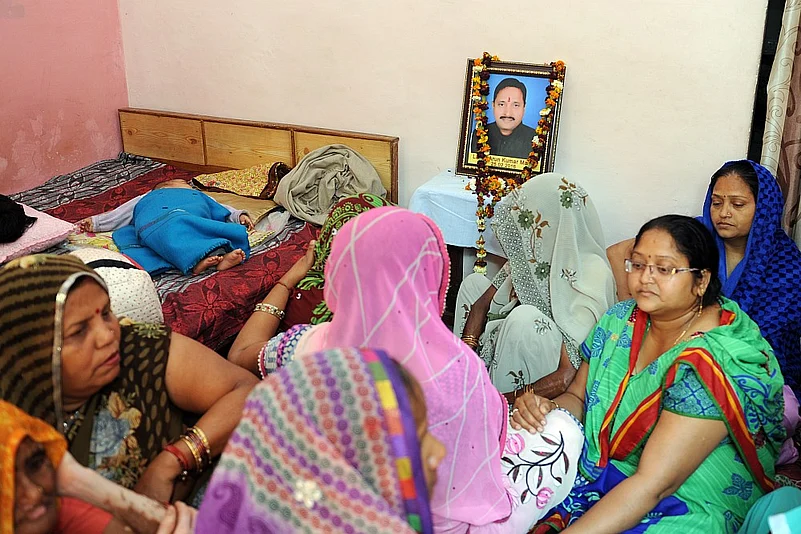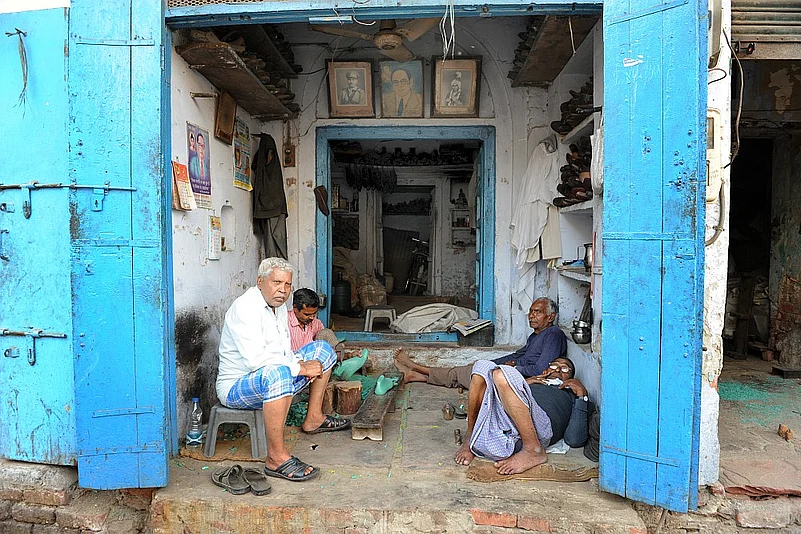On Thursday the union home minister Rajnath Singh gave a clean chit to Agra MP and union minister of state for HRD Ram Shanker Katheria in Parliament. He had himself heard the recording of the controversial speech given by the former RSS Pracharak and found there was nothing inflammatory, the home minister informed the Rajya Sabha.
He however did not say anything about BJP's Fatehpur Sikri MP Chaudhary Babulal who amongst other things asked the Muslims to pick a date if they wanted to test Hindus or about Sadhvi Prachi for that matter.
The issue has gained some traction after the speeches of several right wing leaders were covered by the media and are said to be of a communal nature. The speakers included Katheria, Babulal, VHP national secretary Surendra Jain, Sadhvi Prachi and others at an impromptu condolence meet which was called by the RSS, VHP and BJP last week following the murder of a VHP worker Arun Mahaur.
Advertisement
Following a national uproar over the inflammatory speeches, Agra police registered a case, but, till March 3, the list of accused included three local-level leaders —VHP's Ashok Lavania and BJP's Prashant Chaudhary and Kundanika Sharma—while it left out Katheria and the other prominent leaders. Predictably, this has given rise to considerable heartburn.
"My speech was not targeted at any particular group or community. The police has registered a false case against us. They should investigate all those who actually gave communal speeches including the MPs and senior leaders," said a belligerent Sharma to Outlook. Daughter of a senior Samajwadi Party politician, she has been with the BJP since the early 1990s and is a councillor in Agra since 1995.
The state unit of the BJP is on the defensive and playing down the speeches made by its leaders at the condolence meeting on February 28.
"The BJP will never back down when there is an attack on any community. Why don't you focus on the killing of a young man?" questions BJP state vice president Prakash Sharma. The former national convenor of the Bajrang Dal and VHP spokesperson has been tasked with dealing with the media while ensuring the BJP organisation is mobilising its supporters in Agra.
They have planned several small 'sankalp sabhas' with the plan of expanding the programme to rural areas and some larger events where they intend to get national level leaders to address BJP supporters in the city while memory of the incident is still fresh.
According to the police, local residents, led by Arun Mahaur (vice president of the city's VHP unit), confronted Shahrukh, a local Muslim youth in Mantola for alleged anti-social behavior. In the ensuing scuffle, Shahrukh was assaulted.
Advertisement

The next day Arun Mahaur (40) was shot dead by unidentified motorcycle-borne assailants outside his furniture shop. Later, the blame was fixed on five Mulsim youth including Shahrukh, the nephew of a local Samajwadi party councilor — Pappu Pehlwan.
Local shopkeepers said that following the murder, Mahaur leaders shut down the market in protest of the killing. The rumour quickly spread that Muslims had gunned down Arun because of his agitation against illegal cow slaughter and trafficking.
Security personnel were deployed into the area, which has a mixed population of both Hindu and Muslim communities. The Hindus here are mostly from Dalit groups such as Valmiki, Jatav and Mahaur.
The deceased person's body was moved to the local morgue by the police with a large crowd in tow. "There was high tension amongst the crowds and thousands had gathered," says Rajesh Tyagi, co-convenor of the regional unit of the Bajrang Dal — the youth wing of the VHP.
According to both Tyagi and local BJP councillor and Braj region vice-president Kundanika Sharma, they had to hold back the crowd from taking the corpse to Mantola after the post-mortem because "they were baying for blood and it would have led to a riot. So, we made them conduct the last rites on a street and had Arun's body taken to the ghat for his cremation."
Locals, including BJP politicians, say that Agra has seen some disturbances in the past but communities always settled their disputes and normalcy always resumed immediately afterwards. According to various versions, including those of Tyagi and Sharma, that is how it played out on February 25.
On February 27, however, some Hindutva leaders met and arranged for a condolence meeting on the next day. "It was the Sangh's [RSS] idea. There was a meeting between Ashok Kulsreshth, Hari Shankar and Raghavendra who work for the Sangh and VHP. The two MLAs (Yogendra Upadhyay and Jagan Prasad Garg) and the two MPs were also involved," says a local BJP leader on condition of anonymity.
Katheria was a RSS pracharak and Hindi teacher at the Agra University before joining active politics.
"When there is an order from the RSS, we cannot deny it. Our politics depends on the Sangh,”" said the BJP leader.
The next day, BJP's Sadhvi Prachi also went in along with these other BJP, RSS and VHP functionaries. Government sources claim that the police had planned to place her in preventive detention. However, eyewitnesses claim that she managed to evade the police and made off on a motorcycle with her face covered, leaving her entourage to deal with the cops.
The incendiary speeches that have sparked a national outrage followed. The text and audio recordings of the meeting were later made public.
***

AGRA IS STILL SIMMERING: South of Meera Husseini crossing in Mantola, the road grades steeply downhill into the ghetto where the Dalit population live adjacent to a huge open drain that reeks of garbage and excreta dotted with pigs frolicking in garbage bins.
The beginning of the lane comprises of a few Valmiki families. These are the staunch BJP loyalists. Further down the lane are the Mahaur households, and amongst these is Arun's ancestral house, where one of his uncles continues to live and also runs a small handloom carpet-weaving unit.
The sole handloom worker was agitated about Arun's killing. "The Muslims have killed him. They want us all out and they are buying up all the land around here," said one of these handloom workers, while refusing to disclose his name. He could not identify any houses that had been forcibly bought out by Muslims or the displaced Hindus , nor did he know any one himself but said he had "heard about it".
"But, this Shahrukh used to roam around with a revolver in his belt in broad daylight," says the worker. He again admitted that it was something he had heard but never seen himself.
Back in the marketplace, it is the members of the Jatav caste who outnumber other Dalits in the area. They run most of the small industries segment of Agra's well-known shoe industry and are mostly loyal supporters of the Mayawati-led Bahujan Samaj Party (BSP).
"Mostly the BJP leaders refer to us as the Jatavs or Mahaurs, reminding us of our lower caste background but now, with elections close by, why do they suddenly want to include us in the Hindu community when they need our votes?" says Kamal Singh Jatav, a shoe-maker in Mantola. They do not support the activities of the VHP, considering it vitriolic to peaceful coexistence.
"We don't consider a VHP worker competent till there are some cases against him," says Rajesh Tyagi, the Bajrang Dal leader, with a smug smile. Arun, however, had none in his 22 years of serving the VHP. Tyagi himself has more than a dozen registered against him.
"There have been two other Mahaurs killed within the last two years — Subhash and Ravi. Subhash was killed because he objected to a Muslim youth eve-teasing some Hindu girls. The same thing happened to Arun. Ravi was trying to fight off moneylenders," claims Tyagi.
Analysts have claimed that the communal riots in Muzaffarnagar between Hindus and Muslims had an effect on the 2014 Lok Sabha polls, swinging a large number of votes to the BJP, which espoused Hindu majoritarianism. Mayawati's BSP won no seats in the election despite its earlier command over a large section of Dalits. If communal polarisation in Agra did unite all Hindus politically and electorally, it would impact BSP's influence in the area. Out of nine state assembly seats in the district, the BJP has two (both in the city), the ruling Samajwadi Party has one while the BSP has six.
Arun and his family lived here till two years ago close to his furniture outlet. Around two years ago, his shop was burnt down at night.
VHP regional spokesperson Premendra Jain said, "They had burnt down his shop and then Arun and his family moved out from that locality."
However, nobody could say why exactly the fire had broken out in Arun's shop. Jain and Tyagi later admitted that Arun and his family had in fact moved out to a larger house in a more upmarket locality — a move that could be attributed to his upward mobility.
Strangely, for people who had worked with Arun for 22 years in the VHP, both Jain and Tyagi kept referring to Arun's shop as a pharmacy. Later, it turned out to be a furniture shop.
This makes it difficult to believe Jain and Tyagi who seem to base their narrative on a plate of rumours and half-truths. When asked if there were any Muslims were organized as they claimed, they wondered a while and shot off a few generic names such as Muslim Manch, Islamic Foundation and Jamiat Islamia without being able to pinpoint the key people or at least their offices.
But, who said you need fact to brew a communal curry?
Advertisement
All photos by Jitender Gupta, Outlook.
Jitender Gupta/ Outlook




















